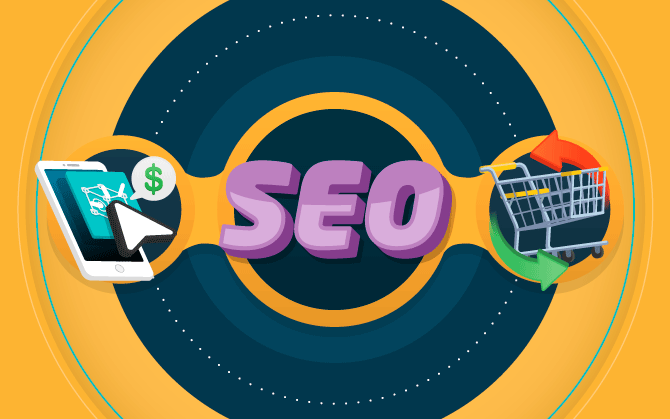
What is the importance of doing SEO for ecommerce?
Understand how SEO can showcase your e-business, and check out 5 strategies to improve it!

What will we see in this post
Thinking about SEO is crucial for ecommerce to follow algorithms’ development and changes in the way of searching for content and products on the Internet.
Optimizations for search mechanisms are strategies whose purpose is to improve the position of pages in search engines like Google and Bing, for example.
The domain of these techniques generates visibility, increases your ecommerce traffic, and, in the end, improves sales.
Ecommerce Data shows that this market has exponentially grown and had revenues of 2.3 trillion USD in sales.
If, on the one hand, growth shows new business opportunities, on the other, the increase of e-commerce worldwide makes competition tougher.
Thus, those who know how to use attraction and sales tactics in the best way to stand out.
To help you in this endeavor, we have set aside some optimization tips. Take a look!
The importance of SEO for your online store
One of the biggest objectives of e commerce managers is to place the Company’s page on the top of Google’s suggestions in an organic search.
To make it happen — and keep the page always highlighted — hard work and constant updates is key, in addition to having a good ecommerce platform..
One keyword only may generate millions of outputs, and most users just explore the first page when searching for products on the Internet. That’s why is so important to keep your business among the first results.
The organic ranking work is time-consuming, however, by investing in the right keywords and building strategies based on the user behavior, it is possible to compete with big brands.
Five tips for optimization of SEO for ecommerce
A good SEO optimization for ecommerce begins with the choice of desirable keywords. These terms are expressions most commonly inserted in Google’s search fields, for example.
Choosing the appropriate word, you can generate thousands of visits to your site organically. However, the user must find what they are searching for, otherwise, your site could be penalized.
In addition to the choice of a keyword, there are other relevant requirements for optimizing a page. Here are the main ones:
1. Use good URLs
An optimized URL must be relevant, attractive, and related to the keyword used in the page. It needs to be as descriptive and clear as possible. Tip: insert a hyphen to separate words and make the URL more readable.
For example, instead of www.suamarca.com.br/serviços/consultoriaonlinemercadofinanceiro, go with www.suamarca.com.br/serviços/consultoria-online-mercado-financeiro.
Also, avoid underlining, and weird characters that can make searches difficult.
A good URL may contribute semantically, as it easily indicates what the page is about. It also helps in relevance, as allows more reference traffic in the search engines and linking, because well-written URLs help to anchor texts when the links are shared in other places.
2. Search the competition
Analyzing competition is a common action in the business world, the so-called benchmarking. Competitors’ SEO analysis is a practice known as skyscraper.
There are tools today that help you to locate keywords used by competitors. MozBar is one of them. This platform finds out lots of information such as, for example, URL, page title, meta description, H1, H2, internal and external links.
Also, by analyzing the competitor’s website, you are able to identify aspects such as language, information and approach chosen by the brand.
This does not mean that you should copy it, but keep in mind that: This is one of the planning steps that may bring relevant information in the search for better results.
3. Invest in link building
Link building is one of the SEO steps that most demand work from the content producer. You can do this type of linking through internal or external forms.
Internal linking is easier to do, as the producer just has to link other texts and products internally in its site. External, in turn, refers to the indication of your page by other sites.
Searchers use several factors for indexing those pages, and links indication is one of them.
For example: If you sell financial market consulting on-line, and EXAME magazine indicates your page as a link, Google understands that the authority of the EXAME magazine page may be extended to you.
Thus, the more reliable sites refer to yours, the better it will be for the SEO of your page. It is possible to get good external links by performing guest posts.
4. Have responsive pages
The use of mobile phones for shopping on the Internet has already surpassed that of other devices. Even with those numbers, some brands still do not invest properly in responsive pages.
Besides compromising user browsing, many purchases get left by the wayside due to the lack of availability of important features.
Google also recognizes responsive pages and places them on top of searches.
This way, mobile commerce pages are those that are flexible and adaptable for making on-line transactions and purchases intuitively and securely.
5. Make a good description of products and meta description
The product description and meta description also are valuable in SEO. Some brands use standard descriptions, many of them provided by the manufacturer and replicated by multiple sites.
However, searchers value clear, customized, and objective descriptions.
Meta descriptions are small blocks of text that appear in the search with a brief summary about the page. This text should be up to 160 characters long and be flashy enough to lead the user to click on the link. Keep in mind the character limit changes without notice.
Additional good practices are: writing short sentences with an active voice and indicating some type of command to the reader.
SEO and its developments
Recognizing the importance of SEO for ecommerce is crucial. Going a little bit further, you need to understand that algorithms are always changing. Early in the 2000s, Google used only links as a ranking factor.
Now, 19 years later, the algorithm is capable of semantic readings, and of giving meaning to the information.
Therefore, it is difficult to foresee changes in this area in the upcoming years, but you can be sure that artificial intelligence and technological developments will increasingly influence how information is sought on the Internet.
A good content manager will always look for new information on the subject, and perform tests and optimizations on their pages.
Did you like our content about SEO for ecommerce? Do you want to learn more and improve your sales? Check our post about platforms, trends, and better strategies of ecommerce!




